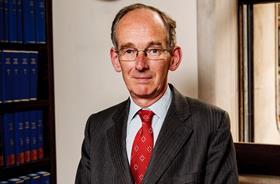Tweets highlighting unreasonable judicial behaviour are likely to be referred to local leadership judges, the president of the family division has warned, after reading two social media posts last weekend about judges.
The wellbeing of the profession has been at the top of Sir Andrew McFarlane's agenda since he took over from Sir James Munby last year.
Writing for the Wellbeing at the Bar website this week, he said it was 'very much a sign of the times' that incidents of alleged 'oppressive and unreasonable' judicial behaviour are occuring 'and causing sufficient exasperation to lead to publication on Twitter', and that the family division president 'is reading these and similar messages'.
McFarlane pointed out that the family justice system has come under increasing pressure. Up until 2016, the system was 'holding its head just above water' to deal with a statutory requirement to complete all public law children cases within 26 weeks, which was also expected of private children cases. However, since 2016 there has been a significant rise in the number of public law (child protection) orders and private law applications.

He said: 'This additional work has had to be processed by the same number of barristers and solicitors, the same number of social workers and CAFCASS officers, the same court staff and the same number of judges.'
The 26-week target is not a present concern for the family law chief. He said: 'Judges and courts should do a full day’s work, but no more. Time must be kept for the lawyers, the court staff and the judges to do work on other cases and, importantly, to have a life outside their work. We are all playing a long game in terms of our careers, our health, and our private and family lives.
'The current unprecedented pressure in the family court is not about to go away. It is unreasonable and unsustainable to expect courts to operate for more than a full day. To do so not only causes undue pressure on the individuals concerned, it also serves to mask the level to which the resources do not match the current workload.'
McFarlane said he hopes his public comments about wellbeing would enable practitioners to feel able to raise workload concerns with individual judges.
'In the unlikely event that a judge does not heed such a request, then it is right for the issue to be raised with the local designated family judge, or family division liaison judge, as may be appropriate. Similarly, if my office becomes aware (either via Twitter or other means) of judicial behaviour which appears to go beyond what is reasonable, it is likely that the matter will be referred to local leadership judges for consideration.'



























11 Readers' comments